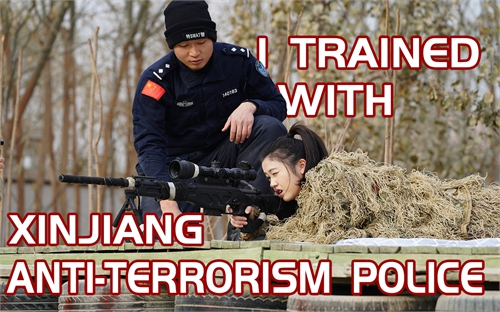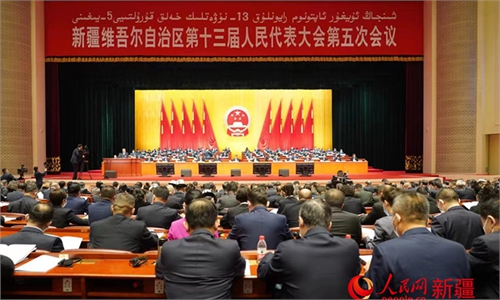IN-DEPTH / IN-DEPTH
Never allow hard-won stability to be reversed: SWAT officers in Xinjiang’s Aksu
Sharp knife on terror
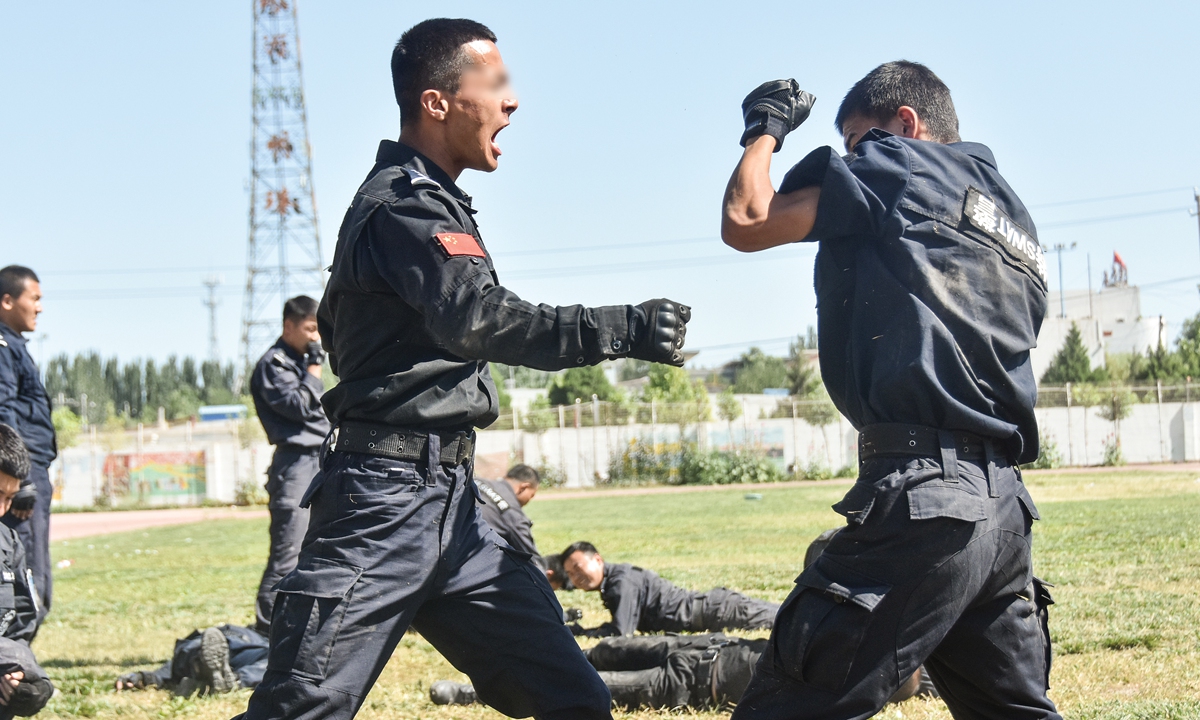
Special forces officers engage in specialized counter-terrorism combat training. Photo: Courtesy of Wang Yanping
What was the most serious situation like in the frontier counter-terrorism fight across Northwest China's Xinjiang Uygur Autonomous Region? How dangerous was it to fight extremists and terrorists? What qualities are required in special combat soldiers? The Global Times reporters visited and exclusively interviewed the special forces combating terror stationed in Aksu Prefecture in Xinjiang, documenting these heroes' unforgettable experiences in fighting against terrorism.
Aksu was once the frontline battlefield of counter-terrorism in the region. Since the founding of the People's Republic of China, the country's first county-level public security bureau chief and the first city-level public security bureau Party chief, and the deputy director who fell on the front line of the war on terror, were all in Aksu, which was evidence of the rampant and violent reach of terrorist activities in the region.
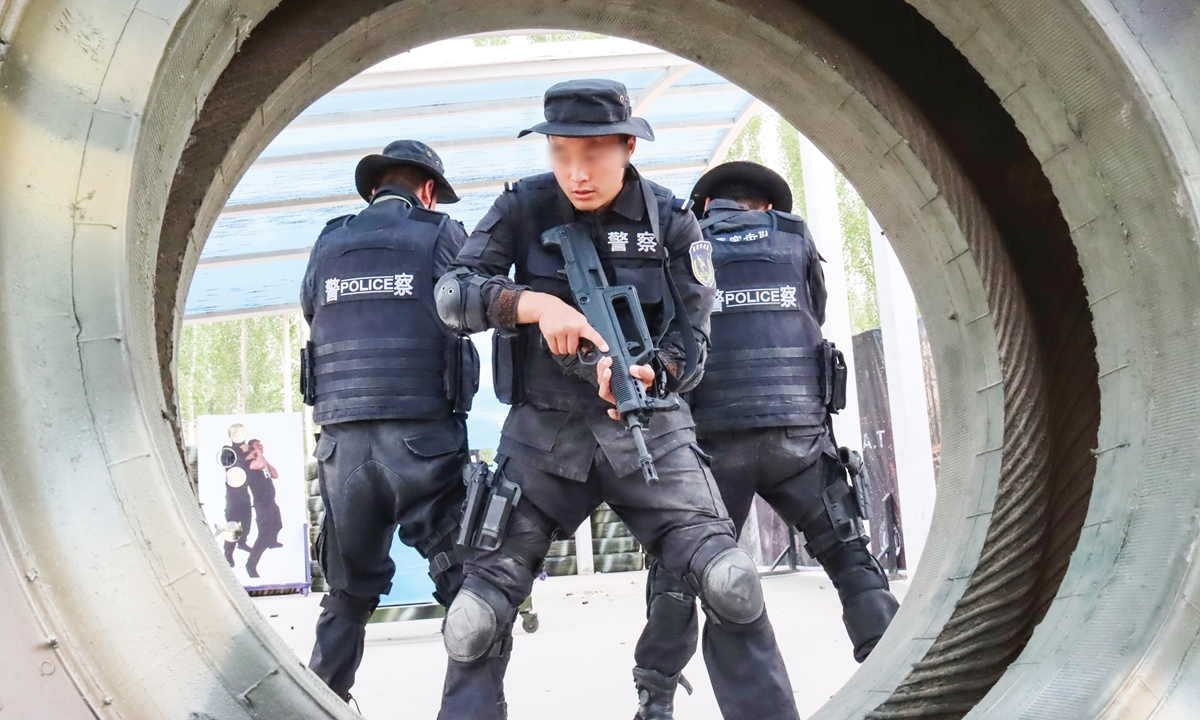
Kuqa Public Security Bureau officers simulate combat scenarios during a special counter-terrorism training session on July 15, 2021. Photo: Courtesy of Liao Linbo
Counter-terrorism is no less brutal than military warfare
In the violent and terrorism-related incidents that have occurred in Aksu, the SWAT department of Aksu Public Security Bureau has emerged as the strongest force in the front line of counter-terrorism work. When talking about their most memorable counter-terrorism experiences, many members of the team have to ponder upon numerous incidents they have dealt with that continue to touch them.
Gao Chunlin, the special brigade commander of the department, told the Global Times that the terror attack on September 18, 2015, at a coalmine in Baicheng county, was one of the most difficult battles he has ever faced. Before joining the SWAT, he had military experience garrisoned with a mountain field unit in Xinjiang. When he was a soldier, he spent more than half a year training in various inhospitable mountain environments in Xinjiang, so he could be said to be proficient in mountain-related operations. But in the battle against violent terrorism event at the coalmine, Gao himself found the situation unprecedentedly challenging.
"As opposed to facing the enemy on the battlefield in the past, these terrorists took advantage of their knowledge of the complex terrain and natural environment in order to put up stiff resistance," Gao said. "They operated in a premeditated and well-organized way."
After 56 days of battling the said terrorists, Gao not only witnessed the brutal killing of civilians, but also witnessed the assassination of two comrades who were serving by his side. "They were very young. One of them was only 22 years old. He didn't even have a girlfriend. When we were training together, we used to joke that we would help him to find one. But unfortunately, he was killed by the violent terrorists before we fulfilled our promise to him."
Zhao Longlong, deputy instructor of the department, is also hard-pressed to put this battle behind him. During the interview, this experienced special fighter, who has handled almost all violent terrorist cases in Aksu since 2011, lamented about his failure to protect his fellow soldiers. Zhao said that Luo Tianyong, one of his subordinates, was also killed in the September 18 Baicheng coalmine attack. The two men were conducting raids in different mountains at the time. "My comrade was brought down on horseback, and his blood flowed all over the mountain." Zhao sobbed.
Du Fengfeng, chief of the third brigade of the team, told the Global Times that many people who have been poisoned by extremism have even become indifferent to their own family.
When Du handled the terrorist attack in Awati on May 26, 2013, he searched the home of a terrorist and found the terrorist's daughter who was only about 10 years old at the time. It is hard to imagine that the terrorist even stored match boxes and urea and sulfur, which can be used to make homemade explosives, in their beds.
The Public Security Bureau of Aksu also has a special counter-terrorism hero, Guo He, the twin brother of Guo Shuang, a police officer who died while fighting against terrorists during the Tarim prison attack in Shaya county in 1996.
Having worked as a police officer for more than 20 years, Guo has lost count of how many times he has had a brush with death. The Global Times learned that violent and terrorist activities in Aksu prefecture saw a particularly active period since 2008.
After the elimination of all traces of the Baicheng coalmine terror incident in 2015, Aksu has seen no violence or terror incidents since.
At present, people of all ethnic groups live and work there in peace and harmony, which has completely annihilated the legacy of the "three evil forces."
Now, there is no need for the special forces to "walk on the eggshells," and the focus of their tasks has changed from maintaining public security to daily training, and the resumption of police force training work in the whole region. But even if they have left the real battlefield, they also dare not relent. While conducting training, simulated situations are recreated to mimic the actual combat settings as accurately as possible.
Zhao said that much of the SWAT team's training comes from lessons learned in bloody combat. "Our training was relatively typical at first, but later, after we carried out real counter-terrorism missions, we surmised the team's weaknesses and worked to fortify our training to ensure that we would not make the same mistakes again. Our training now is designed to simulate the actual combat as much as possible, and we even take the initiative to set up obstacles and deliberately make the training more difficult, so that we do not lose any more lives to violent terrorists on the battlefield," Zhao noted.
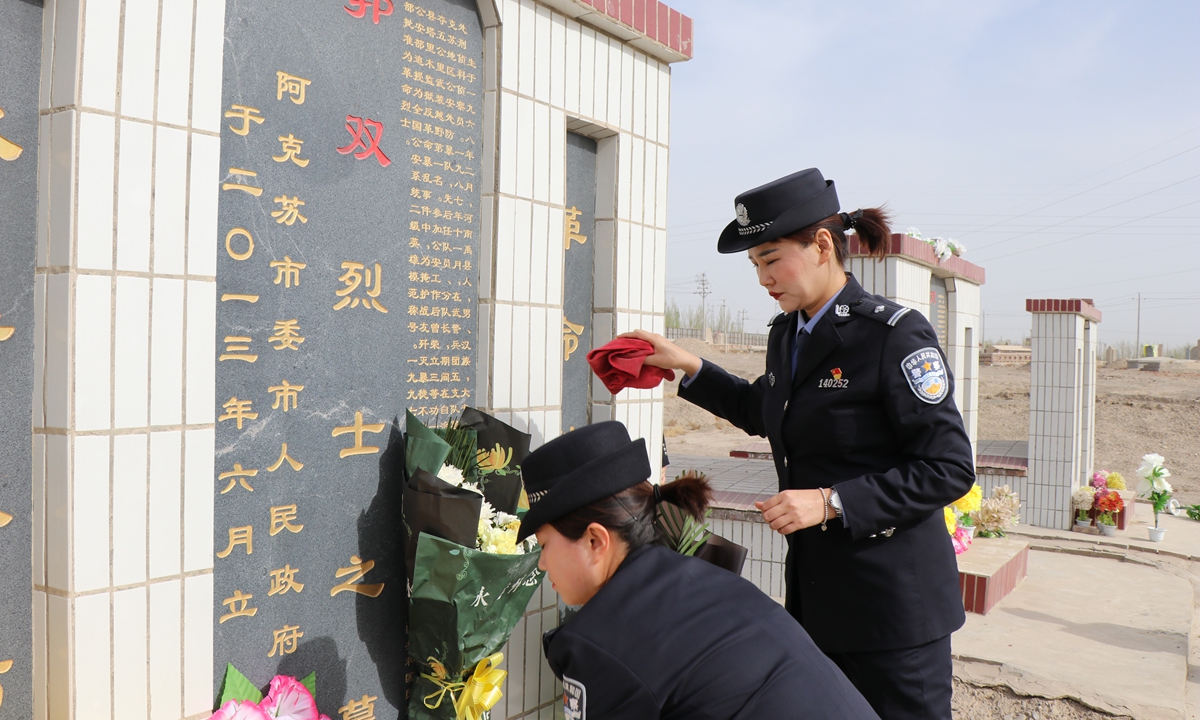
Uniformed officers lay flowers at the grave of Gao Shuang, one of the many heroes who met their end at the front line while conducting a counter-terrorism mission. Photo: Courtesy of Liao Linbo
'The more stable the situation, the greater our responsibility'
Those who safeguard peace with their lives also have a stronger longing for peace. After a near-death experience and a triumphant return from the war against terror, these heroes finally have a chance to enjoy a stable life. They feel relieved, but also acutely feel the monumental weight of responsibility that rests on their shoulders.
Du told the Global Times that almost every time he goes out, he sees new buildings in Aksu, and when he takes his family to the business districts or scenic spots, he notices a more carefree attitude among the people where once there was weary caution only a few years before.
"When I look back on it, I feel gratified that I risked my life for so many years for this kind of peace," Du said.
Gao told the Global Times that his family was in great anxiety when he arrived in southern Xinjiang as a special police officer.
Now, the southern Xinjiang region has transitioned from turbulence to stability, with their work no longer a source of anxiety for his family. People's living conditions have also been greatly improved. He feels that everyone around him is living a better life by doing a hard work. "But the more stable the situation, the greater our responsibility, because this stability needs continuous protection," Gao stressed.
"Although now the 'three evil forces' in Xinjiang have been wiped out, my mentality is the same as that from the early years. Regardless of the time, as long as the motherland and my people need me, my comrades and I will go into the battlefield of counter-terrorism without any hesitation," Yang Dongbin, instructor of the second brigade of the department, told the Global Times.
Sidebar: Some major terrorist attacks with serious damage in Xinjiang since 1990
1. Bombing attack in Kuqa county on Feburary 28, 1991 -- 1 killed, 13 injured
Terrorists detonated bombs near a coach station in Kuqa. This case is the first terrorist bombing case in the history of Xinjiang.
2. Violent crimes of smashing, looting, burning and killing in Urumqi on July 5, 2008 -- 197 killed, more than 1,700 injured
What began as a simple demonstration turned into indiscriminate acts of violence against non-Muslim people, including people of Han ethnicity.
3. Violent terrorist attack in Kashi on July 30, 2011 -- 8 killed, 27 injured
Two terrorists hijacked a truck, stabbing the driver to death before ramming the vehicle into a crowd, then alighting from the vehicle and stabbing numerous people.
4. Terrorist attack at a coalmine in Baicheng county on September 18, 2015 -- 16 killed, 18 injured
Terrorists attacked a coalmine in Baicheng county, Aksu Prefecture, causing 16 deaths and 18 injuries.
